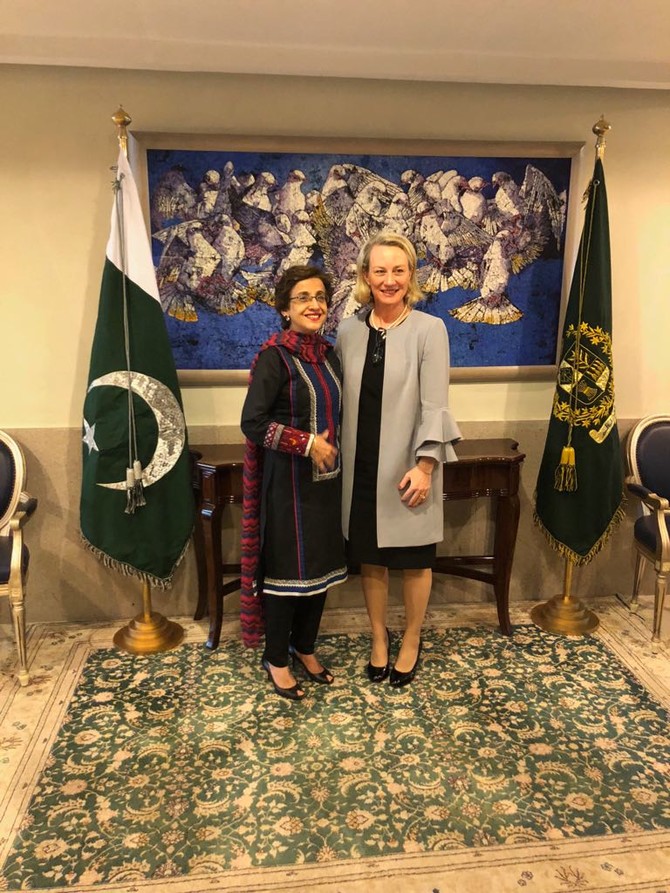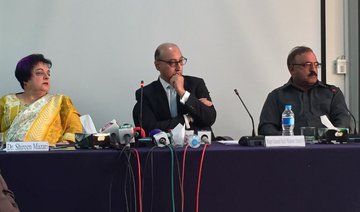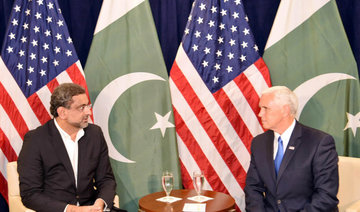ISLAMABAD: Alice G. Wells, the US principal deputy assistant secretary for South and Central Asia, arrived in Islamabad on April 23 to continue talks amid strained relations between the two long-time allies.
The latest trip follows her visit from March 28 to April 3, during which she met several senior federal ministers, UN representatives, National Security Adviser Nasser Janjua, and Army Chief General Qamar Javed Bajwa. She also went to Karachi to meet provincial officials in Sindh.
When she arrived for this followup, she was greeted by Foreign Secretary Tehmina Janjua.
During the previous visit, discussions were held about Washington’s South Asia strategy, unveiled last year, “Pakistan’s stated commitment to eliminate all terrorist groups present within its borders,” and a “shared interest in building economic and commercial ties that benefit both nations” according to the US Embassy.
In the aftermath of the Tashkent conference on Afghanistan, Wells also noted the growing international consensus on the way forward to achieving peace in that country, and the meaningful role that Pakistan, partnering with the United States, could play in achieving that peaceful resolution.
Her latest visit is a follow-up to a series of clashes between the United States and Pakistan over growing differences that threaten decades-old relations between the countries.
The latest row erupted last week after Washington imposed “reciprocal” travel restrictions on Pakistani envoys in the US. After days of speculation, Pakistan’s Ministry of Foreign Affairs last week confirmed that US authorities had informed it that from May 1, 2018, Pakistani diplomats would be restricted in how far they can travel within the United States without official permission.
Foreign-relations expert Qamar Cheema said that “relations are on a slippery slope” and the travel restrictions will probably take center stage in this week’s meetings between Wells and Pakistani officials.
Washington remains unhappy that its efforts to stabilize Afghanistan are being hindered by Islamabad’s feeble approach to dealing with the Haqqani network of insurgents, which the US says operates from Pakistan, an assertion Islamabad has rejected as it reiterates its commitment to combating all forms of terrorism, said Cheema.
“There are concerns on Pakistan’s long-term strategy to counter terror financing, stop the rise of ISIS recruits and its activity, and its assistance with talks and negotiations with the Taliban,” Cheema added.
The latest travel restrictions are in response to Islamabad’s already imposed curbs on US diplomats, which stems from a trust deficit and a number of damaging incidents. These include the US Navy SEAL raid of 2011 that killed Osama Bin Laden in Abbottabad, which was carried out without Pakistan’s prior knowledge.
The Trump administration had warned Pakistan of “punitive measures”. The United States Bureau of Industry and Security, which works under the Department of Commerce, has placed sanctions on seven Pakistani firms purportedly engaged in nuclear trade, a move that damaged Pakistan’s attempt to join the Nuclear Suppliers Group.
A move co-sponsored by the US in February, meanwhile, convinced the Financial Action Task Force to place Pakistan back on its “gray list” of “jurisdictions with deficient anti-money laundering regimes.”
In January, Trump accused Islamabad of taking billions from America and in return giving “nothing but lies and deceit,” and sheltering terrorists. The US withheld $255 million from about $1 billion in assistance. The same month, Washington placed Pakistan on its “special watch list for severe violations of religious freedom.”
“Relations are hanging by a single thread and could free-fall anytime,” Cheema said, but added that the continuation of constructive interaction from both sides at least shows “the belief that cooperation and engagement is the only way forward for peace in the region.”
Senior US Diplomat arrives in Pakistan amid frosty relations
Senior US Diplomat arrives in Pakistan amid frosty relations

- The relationship between Pakistan and the United States is on a ‘slippery slope’ according to foreign-relations expert
- Travel restrictions on diplomats likely to top the agenda
Mauritania ex-leader Aziz jailed on appeal for 15 years

- Aziz had appealed his original five-year sentence after his conviction two years ago of using his power to amass a fortune
- Aziz, 68, remained impassive when the decision was announced
NOUAKCHOTT: An appeals court sentenced Mauritania’s former president Mohamed Ould Abdel Aziz to 15 years in prison on Wednesday for abuse of office and illicit enrichment.
Aziz, who came to power in a 2008 coup, had appealed his original five-year sentence after his conviction two years ago of using his power to amass a fortune.
The former leader, who has been in custody since his original trial began in January 2023, appeared alongside several former top officials and advisers also facing charges of abuse of office, illicit enrichment, influence peddling and money laundering.
The court in the capital Nouakchott also upheld the confiscation of Aziz’s assets and the stripping of his civic rights.
Aziz, 68, remained impassive when the decision was announced, an AFP journalist saw.
Investigators estimate that Aziz, who led the northwest African country of 4.5 million people for more than a decade, accumulated assets and capital worth $70 million during his presidency.
He was found guilty and sentenced to five years in jail in December 2023.
Aziz was excluded from the 2019 presidential election, won by his former right-hand man, Mohamed Ould Cheikh El Ghazouani, who had been at his side for the coup and acted successively as his chief of staff then defense minister.
Aziz led the country linking the Maghreb and sub-Saharan Africa until 2019, returning to general stability a nation once prone to coups and jihadist activities.
He groomed Ghazouani as his successor and handed over to him after elections in 2019 in what was the first peaceful transition of power in a country that proclaimed independence from France in 1960 but then saw decades of political unrest.
At the time of his indictment investigators estimated that Aziz, the son of a merchant, had amassed wealth and capital of 67 million euros ($75 million) over his time in power.
Although not denying his wealth, Aziz has always strenuously contested the accusations against him, seeing a conspiracy to oust him from political life.
His successor has always denied any interference in the case. After remaining discreet about where he had obtained his wealth, Aziz surprised everyone toward the end of his trial by implicating his successor.
He claimed that, the day after the 2019 election, Ghazouani had handed him two suitcases filled with several million euros.
Neo-Nazis plotted terrorist attacks on UK mosques and synagogues

- Court in Britain convicts three far-right extremists who stockpiled more than 200 weapons
LONDON: Three far-right extremists were convicted in a UK court on Wednesday of planning terrorist attacks against mosques and synagogues.
The men were part of an online neo-Nazi group that had stockpiled more than 200 weapons and were close to finishing a 3-D printed semi-automatic gun.
Brogan Stewart, 25, Marco Pitzettu, 25, and Christopher Ringrose, 34, were found guilty of multiple terrorism and firearms offenses, following a nine-week trial at Sheffield Crown Court. They will be sentenced in July.
The group were arrested in February last year after an investigation by counter terrorism police found that the men were intent on carrying out a violent attack.
“These extremists were plotting violent acts of terrorism against synagogues, mosques and Islamic education centers,” said Bethan David, head of the Crown Prosecution Service’s Counter Terrorism Division. “By their own admission, they were inspired by SS (Nazi) tactics and supremacist ideology.”
Counter terrorism police said that the men belonged to an online group that provided an echo chamber of extreme right-wing views. They shared horrific racial slurs, glorified mass murderers and encouraged violence.
The group, which idolized the Nazi Germany regime, prepared for what they claimed would be a “race war” by sourcing body armor and weapons including machetes, hunting knives, swords and crossbows.
“They were a group that espoused vile racist views and advocated for violence, all to support their extreme right-wing mindset,” said Detective Chief Superintendent James Dunkerley, head of Counter Terrorism Policing North East. “All three took real-world steps to plan and prepare for carrying out an attack on innocent citizens.”
Saudi crown prince hopes India-Pakistan ceasefire restores ‘calm’ between neighbors

- India and Pakistan exchanged missiles, drone attacks and artillery fire last week before agreeing to ceasefire
- Saudi Arabia was one of several countries that defused tensions between nuclear-armed India and Pakistan
ISLAMABAD: Saudi Crown Prince Mohammed bin Salman on Wednesday hoped the recent ceasefire agreement between India and Pakistan would contain escalation and “restore calm” between the two neighbors, the Saudi Press Agency (SPA) reported.
Pakistan has credited Saudi Arabia and several other nations for playing a constructive role in defusing its tensions with India last week after fighting erupted between the two. US President Donald Trump announced on Saturday that Washington had brokered a ceasefire between India and Pakistan, calming fears of an all-out war between the nuclear-armed states.
The Saudi crown prince welcomed the ceasefire during his opening address at the GCC-USA summit in Riyadh on Wednesday, which was held in Trump’s presence.
“We welcome the ceasefire agreement between Pakistan and India and hope that it will contain escalation and restore calm between the two countries,” the crown prince said as per the SPA.
The Saudi crown prince said the Kingdom aimed to work with Trump and GCC countries to de-escalate tensions in the region, end the war in Gaza and seek a “lasting and comprehensive solution” to the Palestinian cause.
“Our objective is to ensure security and peace for the peoples of the region,” he said. “We reiterate our support for all endeavors aimed at resolving crises and halting conflicts through peaceful means.”
The fragile ceasefire has temporarily halted hostilities with India and Pakistan trading blame for the conflict.
Judge says Georgetown student can be released from immigration detention as case proceeds

- Khan Suri was arrested by masked, plain-clothed officers on the evening of March 17
VIRGINIA, USA: A federal judge on Wednesday ordered that a Georgetown scholar from India be released from immigration detention after he was detained in the Trump administration’s crackdown on foreign college students.
Khan Suri was arrested by masked, plain-clothed officers on the evening of March 17 outside his apartment complex in Arlington, Virginia. Officials said his visa was revoked because of his social media posts and his wife’s connection to Gaza as a Palestinian American.
They accused him of supporting Hamas, which the US has designated as a terrorist organization.
By the time Khan Suri’s petition was filed, authorities had already put him on a plane to Louisiana without allowing him to update his family or lawyer, Khan Suri’s attorneys said.
A few days later, he was moved again to Texas.
German Chancellor Merz says Israel should bring hostages back alive

- Merz said that in principle it should be possible for an Israeli prime minister to visit Germany
BERLIN: Germany wants to see the hostages held by Hamas in Gaza, including Germans, brought back alive and Israel should consider this in its military actions in the strip, Chancellor Friedrich Merz said on Wednesday.
Asked whether Germany would implement an arrest warrant by the International Criminal Court against Israeli Prime Minister Benjamin Netanyahu, Merz said that in principle it should be possible for an Israeli prime minister to visit Germany.
How this could happen would be clarified when necessary, he said at the joint press conference with UN Secretary General Antonio Guterres in Berlin, adding that no bilateral visits by him or Netanyahu were currently planned.
Merz said future financial support for UNRWA, the United Nations’ agency for Palestinian refugees, was conditional on the organization being reformed.






















